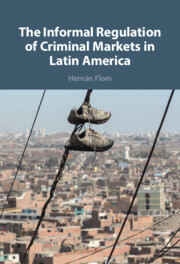Book contents
- The Informal Regulation of Criminal Markets in Latin America
- The Informal Regulation of Criminal Markets in Latin America
- Copyright page
- Contents
- Figures
- Tables
- Acknowledgments
- Abbreviations
- 1 Informal Regulation of Criminal Markets in Latin America
- 2 A Theory of Drug Market Regulation
- 3 Particularistic Confrontation
- 4 Particularistic Negotiation
- 5 Coordinated Protection
- 6 Coordinated Coexistence
- 7 Regulation of Criminal Markets in Weak Institutional Contexts
- Book part
- References
- Index
4 - Particularistic Negotiation
The Decentralization of Police Corruption and Increase in Violence in Rosario, Santa Fe
Published online by Cambridge University Press: 18 August 2022
- The Informal Regulation of Criminal Markets in Latin America
- The Informal Regulation of Criminal Markets in Latin America
- Copyright page
- Contents
- Figures
- Tables
- Acknowledgments
- Abbreviations
- 1 Informal Regulation of Criminal Markets in Latin America
- 2 A Theory of Drug Market Regulation
- 3 Particularistic Confrontation
- 4 Particularistic Negotiation
- 5 Coordinated Protection
- 6 Coordinated Coexistence
- 7 Regulation of Criminal Markets in Weak Institutional Contexts
- Book part
- References
- Index
Summary
This chapter illustrates how police regulation of drug markets in Rosario, Argentina, mutated from a relatively non-violent source of rents controlled by the police and successive administrations to a blend of splintered corruption and unprecedented violence. The Peronist government’s low fragmentation and entrenchment initially enabled it to politicize the police, using it to run coordinated protection rackets that centralized corruption and mitigated violence. However, starting in the mid-1990s, turnover and fragmentation increased due to factional disputes within the ruling Peronist party, triggering multiple police reform cycles. The arrival in power of the Socialist party in 2007 further increased police autonomy and destabilized the local drug market. Police corruption fractured; practically every police precinct ran its own racket. This chaotic drug market made Rosario one of the most violent cities in the country. Despite three consecutive terms in office (2007-2019), Socialist administrations were unable—and perhaps ultimately unwilling—to reform the police, stabilize the drug market and significantly reduce criminal violence.
Keywords
- Type
- Chapter
- Information
- The Informal Regulation of Criminal Markets in Latin America , pp. 95 - 125Publisher: Cambridge University PressPrint publication year: 2022

